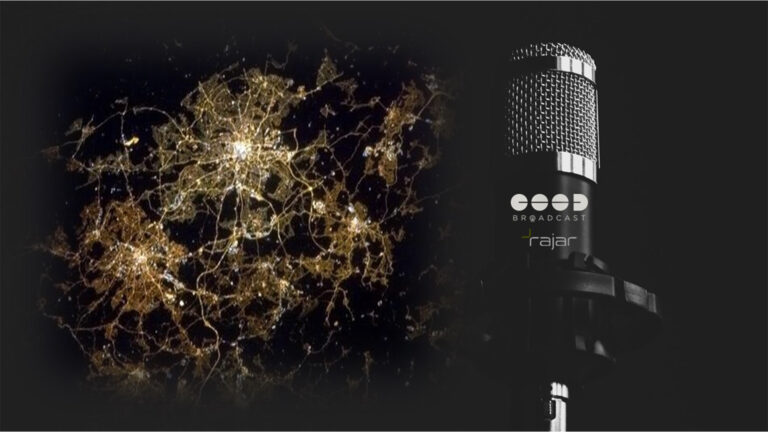What do the figures show?
The figures show that the radio market is healthy. 48.8 million adults (those aged 15+) tuned in each week throughout Q2 2019. Figures like this mean that radio groups can continue to invest to reach us with the type of content we are looking for.
In total, over 1BN hours of radio were listened to throughout the quarter.
On average, here in the North, we are listening to almost 21 hours of live radio per week. 60% of us tune in at home, 24% in the car and 16% at work. The data isn’t as granular – but I’d love to know how much radio was listened to on the Regent Road roadworks.
Digital platforms continue to grow – with ‘digital’ now having a market share of all listening of around 56%.
Interestingly, home assistant platforms are growing too. 94% of speaker owners say that they use their Alexa or Google Home devices to listen to live radio.
So, let’s dig into what is happening across the North.
Manchester
The big winners in Manchester during this quarter are Capital and Radio X. Capital now has 452,000 weekly listeners whilst Radio X moves up to 170,000.
Interestingly, Heart North West, which operates a new Breakfast show out of London increases its share by 10,000. This is the highest ever reach and most amount of hours listened to in the last years of reporting. As the networked show launched in June, its full impact won’t be seen until the next quarter’s results.
Hits Radio has dipped to an audience of 258,000 as there is a shake-up of presenters seeing Gemma, Gethin and Dave depart in place of Fleur, Greg and James.
From a BBC point of view, BBC Manchester has 171,000 listeners. Interestingly, during this period BBC Radio Manchester has teamed up with the Salford Lad’s Club to profile the importance of opening up during Mental Health Awareness Week. It is these aspects which showcase the power of radio – and broadcast as a whole.
Leeds/York/Yorkshire
Heart Yorkshire has dropped from 460,000 to 426,000 during the period.
Capital Yorkshire has 945,000 listeners – which is an upswing from last quarter. Capital launched its networked Breakfast show in April.
BBC Radio York dips slightly to 66,000, as does BBC Radio Leeds (which moves to 196,000) and BBC Radio Humberside (138,000) however there is usually a slight downward movement in the warmer months as we are out and about more than the rest of the year.
Liverpool
In Liverpool, Capital is also proving strong. It has increased its audience to 208,000 each week. That increase looks especially good as BBC Merseyside drops to 236,000 (from 271,000).
Radio City has perhaps taken some of this share as it has increased to 361,000 (from 339,000).
Newcastle
BBC Radio Newcastle remains strong with 216,000 listeners – which represents a slight dip of 3,000.
Metro Radio has picked up here – growing to 263,000 (from 248,000).
So what does this all mean?
In truth, the picture looks good. Q2 often sees a dip as listeners are out and about or are typically on holiday more – we would expect most numbers to be back in place by Q3.
It does however show strength in the commercial network – valued around 700M.
Heart and Capital, as well as its parent company Global, will have an interesting question. During this quarter they rolled out the All New Heart Breakfast show which removed the ‘local’ content (e.g. presenters) with the content coming from London presented by Amanda Holden and Jamie Theakston. This follows Capital’s move with the Breakfast Show – which has opened to strong figures nationally (3.8M UK wide).
In these examples – whilst the content is centralised – newsgathering stays local. In some areas it seems to have benefitted – and in some it hasn’t.
A few years back, BBC England centralised its evening shows across the local network. That decision was however reversed as Aunty placed emphasis on the power of local.
We know that Global has rolled this out across Capital and Smooth too – but what does this mean for ‘local’?
How is BBC Sounds doing?
In the last quarter I mentioned BBC Sounds which will help bring new audiences to radio – and engage with brand new audiences.
The Beeb has highlighted that the app is seeing around 1.3m weekly users. In essence, it is doing well. The app continues to be adapted with a greater focus on personalisation which makes for an exciting future.
If you haven’t already – I’d highly recommend trying it out… especially as media professionals exploring the world of ‘podcasts’.
Radio Recap – What Do You Need To Know About The Quarter?
BBC Radio 5 Live – Danny Baker was fired for a tweet.
BBC also announced its presenter salaries during the period
Fleur East, Greg Burns and James Barr join Hits Radio as Gemma, Gethin and Dave exited
Kate Williams announced her cystic peritoneal mesothelioma on BBC Radio 5/ You Me & The Big C showing the real ‘human’ side of radio.
OFCOM revealed that women and ethnic minorities are still under-represented within radio.
Heart launched its Breakfast show from London – removing 22 local breakfast shows across the country. Plans revealed for Capital and Smooth to follow suit.












